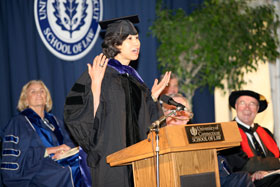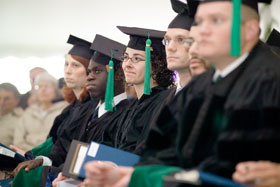  |
| HOME | THIS ISSUE | CALENDAR | GRANTS | BACK ISSUES | < BACK | NEXT > |
Health Center, Law School students graduateby Pat Keefe & Michael Kirk - May 30, 2006
|
||||||
|
Health Center To be successful in their careers, medical, dental, and bio-physical science graduates should maintain “balance” in their lives, said the speaker at the Health Center’s 35th Commencement on May 14. And the “four food groups” of balance are professionalism, spirituality, love, and fun.
Dr. Francis S. Collins, director of the NIH National Human Genome Research Institute, told the graduates, “Wisdom imparted at graduation ceremonies has a half-life of about a millisecond. But you need to seek a balanced life. This is a challenge to you to nurture.” Collins, who has a Ph.D. as well as a medical degree, led the National Institutes of Health Human Genome Project, completed in 2003, when the last sequence of the human genetic blueprint was mapped. It’s an honor and a privilege to be involved in the healing arts, he said. Students entering the profession now are doing so at a particularly interesting time. The genome project will allow healers to personalize their treatments, and even more importantly, to engage in preventive and preemptive genetic therapies. “But technology must not exceed our humanity,” he said, quoting Albert Schweitzer. He told a story about a mission he made to the delta region of Nigeria where he treated a young farmer with swollen legs and other serious symptoms. Despite the dire medical situation, the treatment was almost instantly successful. But Collins was overwhelmed by the misery and squalor, and wondered why he was there. The next day when he visited his patient, the young farmer told him, if you’re wondering why you’re here, “you are here for me.” “He was right,” Collins said. “What’s important is what happens to one person.” A developed sense of spirituality is vital, he said, because physicians struggle with profound questions every day. “What is the meaning of suffering? How can you know right from wrong, but not be able to do anything about it?” he asked. There’s a perception that faith is a fuzzy area and is incompatible with science, he said. Not so. Cultivate spirituality. “Spirituality is comfort when a crisis causes us to face our own spiritual impoverishment,” he said. Medicine is full of sobering, tragic moments, he added. “I believe, like Churchill, that you cannot deal with the most serious things in the world unless you also understand the most amusing.” Collins then strapped on a guitar and sang a parody of Frank Sinatra’s My Way. He earned a standing ovation, before receiving an honorary UConn Doctor of Science degree. Dr. Peter Deckers, Health Center executive vice president and dean of the School of Medicine, accepted the Health Center Board of Directors’ Faculty Recognition Award on behalf of the late Dr. Richard Berlin, associate dean for research planning and coordination and head of the Department of Cell Biology. “He was a man of wisdom,” Deckers said. “Civil, cultured, and a person of great dignity.” Brian Shaughnessey, who received his D.M.D. degree, spoke for the dental students; and Joshua Kallen, who graduated with an M.D. degree, spoke on behalf of the medical students. Seventy-six physicians and 45 dentists graduated. In addition, 36 master of public health degrees were awarded.
Law School During Commencement at the UConn School of Law on May 21, U.S. Circuit Court Judge Allyson Duncan urged the 282 graduates to make a plan for their lives and follow it, but also “to never underestimate the value of serendipity.” Duncan, a federal judge from the Fourth Circuit in North Carolina, was awarded an honorary Doctor of Laws degree. She noted that her husband, who is also a judge, is a graduate of the UConn Law School. She said she planned to hang her new degree on the wall next to his at their home. “I will point to it as a testimonial to the fact that a woman can often accomplish in one morning what it takes a man several years to achieve,” she said, to laughter and applause. During her address, Duncan discussed her rise to her current position, pointing out that a rigid plan in life would have probably not led her there. She said she was grateful for the many twists and turns her career has taken as a law professor, a losing candidate for the North Carolina Court of Appeals, a lawyer in private practice, a member of her state’s public utilities commission and, finally, a federal judge. “If there is a common thread to my experiences, it is that each presented a unique opportunity that I chose to seize when it presented itself, usually against the advice of someone – and sometimes everyone – who professed to have my best interest at heart,” she said. “And each was a happy and largely unexpended discovery – rather like penicillin.” Graduates and guests assembled on the campus lawn, soggy from weeks of rain, to hear Duncan’s address. Prior to the speech, the outgoing dean of the Law School, Nell Newton, addressed the crowd, telling graduates: “You gave back to your neighborhood, state, and society. You can look back with pride at all you have accomplished.” Newton, who is leaving UConn this summer to become dean at the University of California’s Hastings School of Law in San Francisco, ran through the many accomplishments of the graduating class, including volunteering to aid with the relief efforts following Hurricane Katrina, advocating on behalf of children, providing legal services to the poor, and providing legal aid to foreigners seeking asylum in the United States as part of the school’s Asylum and Human Rights Clinic. Present at the ceremony was a family from Haiti on whose behalf a group of UConn students worked, in an effort to convince U.S. immigration courts that the family should be granted asylum. The case involved a young man who was frequently attacked in Haiti because of a disability. His family was helpless to shield him, and Haitian authorities were unable or unwilling to intervene. Through the efforts of the students, he was granted asylum; but in a separate case, his family was being deported back to Haiti. A second group of students worked to convince an immigration court in Hartford that they too should be allowed to stay. If they were deported, they would have to either abandon their son to the state’s care or take him with them back to Haiti, where he would face continued physical abuse. In the end, the entire family was allowed to remain in the U.S. The students who worked on the case – Susan Lineberger, Elinor Kim, Heather Avery, and Sheeba Roy – were graduating, and the family attended the ceremony to express their gratitude. |
| ADVANCE HOME UCONN HOME |


